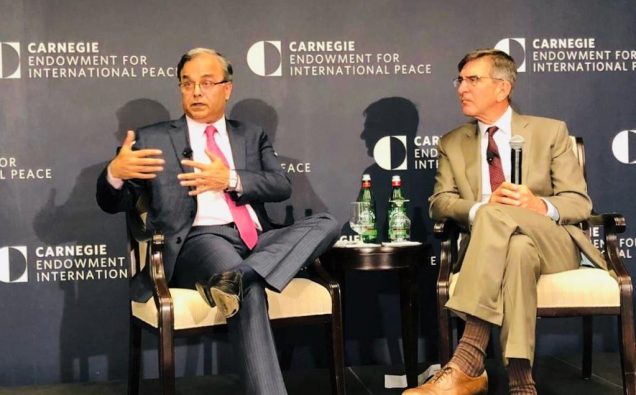
Pakistan and the United States can build a mutually beneficial and durable relationship with cooperation in areas of convergence, Islamabad’s ambassador in Washington said Monday as the two countries struggled to smooth out differences on some key regional issues.
Ambassador Asad M Khan listed quest for peace in Afghanistan as an example of ongoing cooperation but underscored that Pakistan – at the confluence of South Asia, the Middle East and Central Asia – is a vitally important country for its own potential.
“I think I see good tidings,” he said during a talk at Carnegie Endowment for International Peace, when asked pointedly if the U.S. and Pakistan would move from a security-centered relationship to ties based on investment and mutual respect. The envoy referred to recent Exxon Mobil and IHOP investments in Pakistan.
“One very important convergence, where the president of the United States (Donald Trump) wants to see peace in Afghanistan. We have a prime minister (Imran Khan) who has been a longstanding advocate of resolution of that conflict.”
“The other area (of investment) where we see a lot of potential. Our job really is that we need to move out to business and investment. There are tremendous possibilities and opportunities.
We happen to be sandwiched between China and India but we are a significant country,” he said during the conversation moderated by moderated by Dr. George Perkovich, Ken Olivier and Angela Nomellini Chair and Vice President for Studies at the Carnegie
Among other commonalities Ambassador Khan counted are a vibrant Pakistani-American community, a large number of Pakistani bureaucrats and military officers having the American connection through education and training and the fourth largest English speaking population in Pakistan.
“These are natural anchors — What unites is much more than what divides us.”
But despite Islamabad’s recent cooperation on pushing an Afghan peace process, the U.S. and Pakistan do not see eye-to-eye on several regional issues like India’s efforts to destabilize Pakistan and New Delhi’s allegations concerning cross-border terrorism. The U.S. also has reservations over the way China is trying to amplify its influence through a corridor passing through Pakistan. Meanwhile, the U.S.-Indian defense cooperation is growing apace, pushing Pakistan toward its competitor China and Russia.
Pakistan also faces a trust deficit on the Capitol Hill, where many lawmakers remain skeptical of the country’s counterterrorism efforts.
In the latest frictional tit-for-tat move, Washington has limited permission-free travel for Pakistani diplomats to a 25-miles radius.
“There are issues on both sides that we are trying to resolve,” Ambassador Khan said.
Ambassador Khan also noted that Pakistan’s relations with the international friends are not mutually exclusive. The country has a growing economic relationship with China and decades-old investment and trade ties with the United States, he pointed out.
The diplomat took issue with the U.S. travel advisories for American citizens intending to visit Pakistan, saying the situation on the ground has changed for the better. He said Pakistan has launched a new visa-on-arrival program for American businesses and with a jump in tourism looks forward to having more and more American investment















